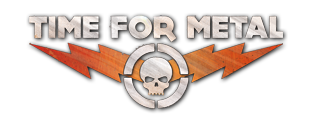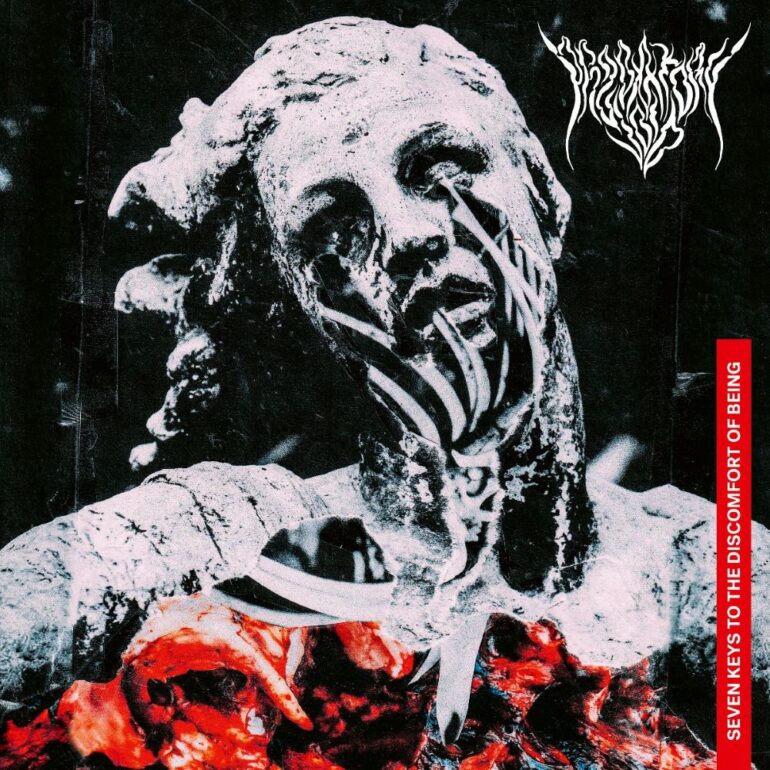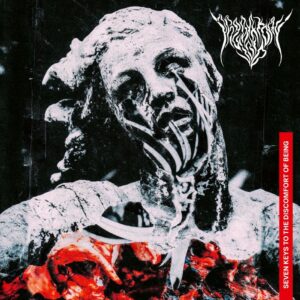Artist: Predatory Void
Herkunft: Gent, Belgien
Genre: Black Metal / Noise Rock
Label: Century Media Records
Link: https://www.facebook.com/PredatoryVoid
Bandmitglieder:
Gesang – Lina R
Gitarre – Lennart Bossu
Gitarre – Thijs De Cloedt
Bass – Tim De Gieter
Schlagzeug – Vincent Verstrepen
Time For Metal / René W.:
Hallo, lieber Lennart,
ihr habt vor einem Monat euer Debüt Seven Keys To The Discomfort Of Being veröffentlicht und auf dem Longplayer eine explosive Mischung aus Black Metal und Noise Rock zusammengetragen. Wie habt ihr als Band zusammengefunden, wie entstand die Idee zur Gründung von Predatory Void und wie habt ihr den Prozess des Songwritings aufgenommen?
Predatory Void / Lennart:
Die Idee zu Predatory Void entstand in der Zeit der Lockdowns. Alle meine anderen musikalischen Aktivitäten kamen zum Erliegen und so spielte ich zu Hause eine Menge Gitarre. Zuerst war es ein bisschen ziellos, aber nach einiger Zeit bemerkte ich, dass ich einige Songs hatte, die sich stimmig anfühlten, aber vielleicht nicht ganz Amenra-Material waren … das brachte mich auf die Idee, eine neue Band zu gründen. Ich kannte Lina schon lange, und sie schien mir eine interessante Person zu sein, um etwas mit ihr auf die Beine zu stellen, und bald stießen auch Tim, Thijs und Vincent zu uns. Obwohl ich den Großteil der Songs zu Hause selbst geschrieben habe, hat jeder seinen eigenen Stempel aufgedrückt.
Time For Metal / René W.:
Du hast Predatory Void ins Leben gerufen. Bist du bei Amenra und Oathbreaker nicht ausgelastet? Spaß beiseite. Was erwartet Fans deiner anderen Bands auf diesem Debüt und welche klaren Abgrenzungen ziehst du zu deinen anderen Projekten?
Predatory Void / Lennart:
Oathbreaker liegen derzeit auf Halde, also zählt das nicht wirklich. 😉 Aber im Ernst, ich denke, dass die Leute, die meine anderen Bands mögen, definitiv einige Stücke dieser musikalischen DNA auch in Predatory Void hören werden, das ist nur logisch. Ich bin schließlich zu einem großen Teil davon abhängig, was dabei herauskommt, wenn ich meine Gitarre spiele, und das absichtlich komplett zu ändern, würde sich vielleicht ein bisschen unaufrichtig anfühlen. Es gibt also nicht wirklich eine klare Trennung zwischen den verschiedenen Bands. Die Entscheidung, was wohin gehört, hängt oft von Dingen wie dem Tempo eines Songs usw. ab.
Time For Metal / René W.:
Welche Thematik greift Seven Keys To The Discomfort Of Being auf? Kannst du in einem kurzen Showdown deine Ideen und die Story um die Tracks offenlegen?
Predatory Void / Lennart:
Unsere Sängerin Lina ist für alle Texte verantwortlich, und wir haben es ihr überlassen, was sie in den Liedern vermitteln möchte. Für sie geht es auf dem Album darum, sich nach einer langen Zeit der seelischen Suche mit sich selbst zu arrangieren, Aspekte von sich selbst zu verleugnen, verletzend oder wahnhaft zu sein, was die eigene Persönlichkeit oder den eigenen Charakter betrifft. Es kann als eine philosophische Reise zu einem Absoluten gesehen werden, die eine Wendung nimmt und sich auch mit der Körperlichkeit des Menschseins beschäftigt.
Time For Metal / René W.:
Mit Century Media Records habt ihr direkt ein mächtiges Label im Rücken. Wie kam es zum Kontakt und zur Zusammenarbeit?
Predatory Void / Lennart:
Vor Jahren hatten mich meine Freunde von Amenra mit Leuten von Century Media für ein Projekt zusammengebracht, das damals nicht funktionierte. Sie verfolgten aber weiterhin die Bands in unserer Szene, und dieses Mal stellte sich heraus, dass es der richtige Zeitpunkt für eine Zusammenarbeit war.
Time For Metal / René W.:
Euer Artwork hat mich am Anfang etwas irritiert, man könnte euch damit in die Gothic oder EBM Szene stecken, zumindest unsere in Deutschland schwört auf ähnliche Artworks. Wie kam zu diesem CD-Cover und welche Emotionen verbindet ihr damit?
Predatory Void / Lennart:
Das Albumcover wurde von einem Künstler namens Sven Harambašić gestaltet. Mit gefällt, dass es nicht das typischste Artwork für unser Genre ist, aber ich finde, dass er unseren Sound darin ziemlich gut eingefangen hat. Sein Stil besteht oft aus ziemlich kruden Collagen, und für mich ist das mehr oder weniger auch die Art, wie unsere Songs geschrieben wurden. Ich habe eine Menge meiner Einflüsse zusammengefügt und mehr auf ein Gesamtgefühl als auf ein ausgefeiltes Songwriting geachtet. Ich kann etwas von dieser Rohheit auch in seiner visuellen Kunst erkennen.
Time For Metal / René W.:
Wie geht es für euch in den nächsten Wochen weiter? Werdet ihr auf Open Airs zusehen sein, gibt es eine Tour im Herbst oder sind andere Projekte nach dem Release wieder wichtiger?
Predatory Void / Lennart:
Es wird weitere Shows im Sommer, Herbst und Winter geben. Ein paar Festivals hier und da und auch eine kurze Europatournee, die in Kürze angekündigt wird.
Time For Metal / René W.:
Bleibt es bei diesem einen Album oder dürfen sich die neuen Anhänger auf weitere Werke aus dem Hause Predatory Void freuen?
Predatory Void / Lennart:
Ich habe das Gefühl, dass dieses erste Album eine gute Möglichkeit für die Band war, sich musikalisch kennenzulernen. Jetzt, wo wir eine Vorstellung davon haben, wozu jeder Einzelne fähig ist, hoffe ich, dass wir gemeinsam auf Entdeckungsreise gehen können und vielleicht einige unerwartete Ergebnisse erzielen. Ich sehe dieses Album also definitiv als Ausgangspunkt für etwas Größeres.
Time For Metal / René W.:
Die Welt wird immer digitaler und unpersönlicher. Wie nehmt ihr das als Musiker auf? Versucht ihr auf sozialen Plattformen für interessierte Headbanger erreichbar zu sein oder haltet ihr euch als Band auf Facebook, Instagram und Co. eher zurück?
Predatory Void / Lennart:
Ich bin nicht unbedingt der Meinung, dass digital gleichbedeutend mit unpersönlich ist. Das digitale Zeitalter hat es auf jeden Fall viel einfacher gemacht, dass Musik die Menschen erreicht, die sie potenziell mögen würden. Und die sozialen Medien ermöglichen einen gewissen persönlichen Kontakt mit den Menschen, die sich für unsere Musik interessieren. Ich verabscheue das ständige Bedürfnis, in den sozialen Medien Inhalte zu generieren, deshalb versuchen wir als Band, ein gesundes Gleichgewicht zu finden.
Time For Metal / René W.:
Für noch unbekanntere und gerade frisch gegründete Acts kann man aber auch viele Vorteile daraus ziehen. Ihr seid zum Beispiel bei Spotify, was finanziell nicht die Taschen vollmacht, aber die Möglichkeit bietet, ultraflink in viele Ohren zu gelangen. Seid ihr eher im Lager pro oder kontra Streaming-Dienste zu finden?
Predatory Void / Lennart:
So wie ich das sehe, ist die Frage, ob man für oder gegen Streamingdienste ist, nicht mehr relevant. Es ist jetzt einfach eine Realität. Ich respektiere Bands, die sich nicht daran beteiligen, aber ich möchte mir das Leben nicht so schwer machen. Und obwohl ich den Leuten, die unsere physischen Alben immer noch kaufen, sehr dankbar bin, gefällt mir die Tatsache, dass unsere Musik rund um den Globus leicht zugänglich ist.
Time For Metal / René W.:
Ich bedanke mich für deine Zeit Lennart und wünsche dir weiterhin viel Spaß an den harten Noise Riffs. Das letzte Wort gehört dir und kannst du ganz frei an unsere Leser und eure Anhänger wenden.
Predatory Void / Lennart:
Vielen Dank, dass ihr euch die Zeit genommen habt, das Interview zu lesen, und dass ihr unsere Band angecheckt habt. Wir hoffen, dass wir einige von euch in diesem Jahr sehen werden!
Time For Metal / René W.:
Hello Lennart,
A month ago, you released your debut album, Seven Keys To The Discomfort Of Being, which brings together an explosive mix of black metal and noise rock. How did you come together as a band, what was the idea behind forming Predatory Void, and how did you approach the songwriting process?
Predatory Void / Lennart:
The idea for Predatory Void came about in the Covid lockdown period. All my other musical activities had seized, so I found myself playing a lot of guitar at home. At first, it was a bit aimlessly, but after some time I noticed that I had some songs that felt coherent but maybe weren’t quite Amenra material … that sparked the idea to form a new band. I had known Lina for a long time already, and she seemed like an interesting person to try this with, and we were quickly joined by Tim, Thijs and Vincent. Although I had written the bulk of the songs at home by myself, everyone definitely left their own mark on them.
Time For Metal / René W.:
You started Predatory Void. Aren’t you busy enough with Amenra and Oathbreaker? Just kidding. What can fans of your other bands expect from this debut, and what is the line you draw between your other projects?
Predatory Void / Lennart:
Oathbreaker is currently on hiatus, so that one doesn’t really count. But in all seriousness, I think that people who like my other bands will definitely hear some pieces of that musical DNA in Predatory Void as well, but I feel that’s only logical. I am, after all, to a great extent dependent on what comes out when I play my guitar, and to purposely completely change that would maybe feel a bit disingenuous. So there’s not really a clear line drawn between the different bands. Deciding what goes where often depends on things like the tempo of a song etc.
Time For Metal / René W.:
What themes does Seven Keys To The Discomfort Of Being explore? Can you explain your ideas and the story behind the tracks?
Predatory Void / Lennart:
Our singer Lina was responsible for all the lyrics, and we left it up to her to determine what she wanted to convey in the songs. For her, the album is about coming to terms with who you are after a long time of soul-searching, denying aspects of yourself, being hurtful or delusional regarding one’s own personality or character. It can be seen as a philosophical journey towards an absolute that takes a turn, and also deals with the physicality of being a human.
Time For Metal / René W.:
With Century Media Records behind you, you have a powerful label supporting you. How did you make contact and collaborate with them?
Predatory Void / Lennart:
Years ago, my friends in Amenra had put me in touch with people at Century Media for something that didn’t work out back then. They kept following the bands in our scene though, and this time it turned out it was the right time to collaborate.
Time For Metal / René W.:
Your artwork initially confused me. It could be interpreted as gothic or EBM, and at least in Germany, we tend to associate similar artworks with those scenes. How did you come up with this album cover, and what emotions does it evoke for you?
Predatory Void / Lennart:
The album art was all done by an artist called Sven Harambašić. I liked that it’s maybe not the most typical artwork for our kind of music, but I feel that he did capture our sound in it quite well. His style often consists of rather crude collages, and for me that’s more or less how our songs were written as well. I put together a lot of my different influences and went more for an overall feeling than for refined song craft. I can recognize some of that same rawness in the visual art as well.
Time For Metal / René W.:
What’s next for you in the coming weeks? Will you be playing any open-air shows, going on tour in the fall, or focusing on other projects after the album’s release?
Predatory Void / Lennart:
There’ll indeed be more shows throughout the summer, fall and winter. A few festivals here and there, and a brief European tour as well that will be announced shortly.
Time For Metal / René W.:
Will this be the only album, or can new fans expect more from Predatory Void in the future?
Predatory Void / Lennart:
For me, it feels like this first album has been a good way for the people in the band to get to know each other musically. Now that we have an idea of what everyone is capable of individually, I hope that we now can start exploring together and maybe get some unexpected results. So I definitely see this album as a starting point for something greater.
Time For Metal / René W.:
The world is becoming increasingly digital and impersonal. How do you feel about this? Do you try to reach fans on social media platforms, or do you tend to avoid Facebook, Instagram, and other platforms as a band?
Predatory Void / Lennart:
I don’t necessarily feel that digital equals impersonal. The digital age has definitely made it a lot easier for music to reach the people who would potentially enjoy it. And social media do allow for a somewhat personal contact with the people who are interested in our music. I do detest the incessant need to generate content on social media, so as a band we’re kinda trying to find a healthy balance in that.
Time For Metal / René W.:
For lesser-known and newly-formed acts, however, there can be many benefits to being on digital platforms. For example, you’re on Spotify, which might not make you rich, but it provides a way to quickly reach a lot of listeners. Do you lean towards being for or against streaming services?
Predatory Void / Lennart:
The way I see it, being for or against streaming services is not even a relevant question anymore. It’s just a reality now. I absolutely respect bands who don’t take part in it, but I don’t want to make life that hard for myself. And while I am extremely grateful to the people who are still buying our physical albums, I do like the fact that our music is easily accessible around the globe.
Time For Metal / René W.:
Thank you for your time, Lennart, and I wish you continued enjoyment of those hard noise riffs. The last word is yours, and you’re free to address our readers and your fans however you’d like.
Predatory Void / Lennart:
Thanks a lot for taking the time to read this and for checking out our band. We hope to see some of you on the road later this year!



